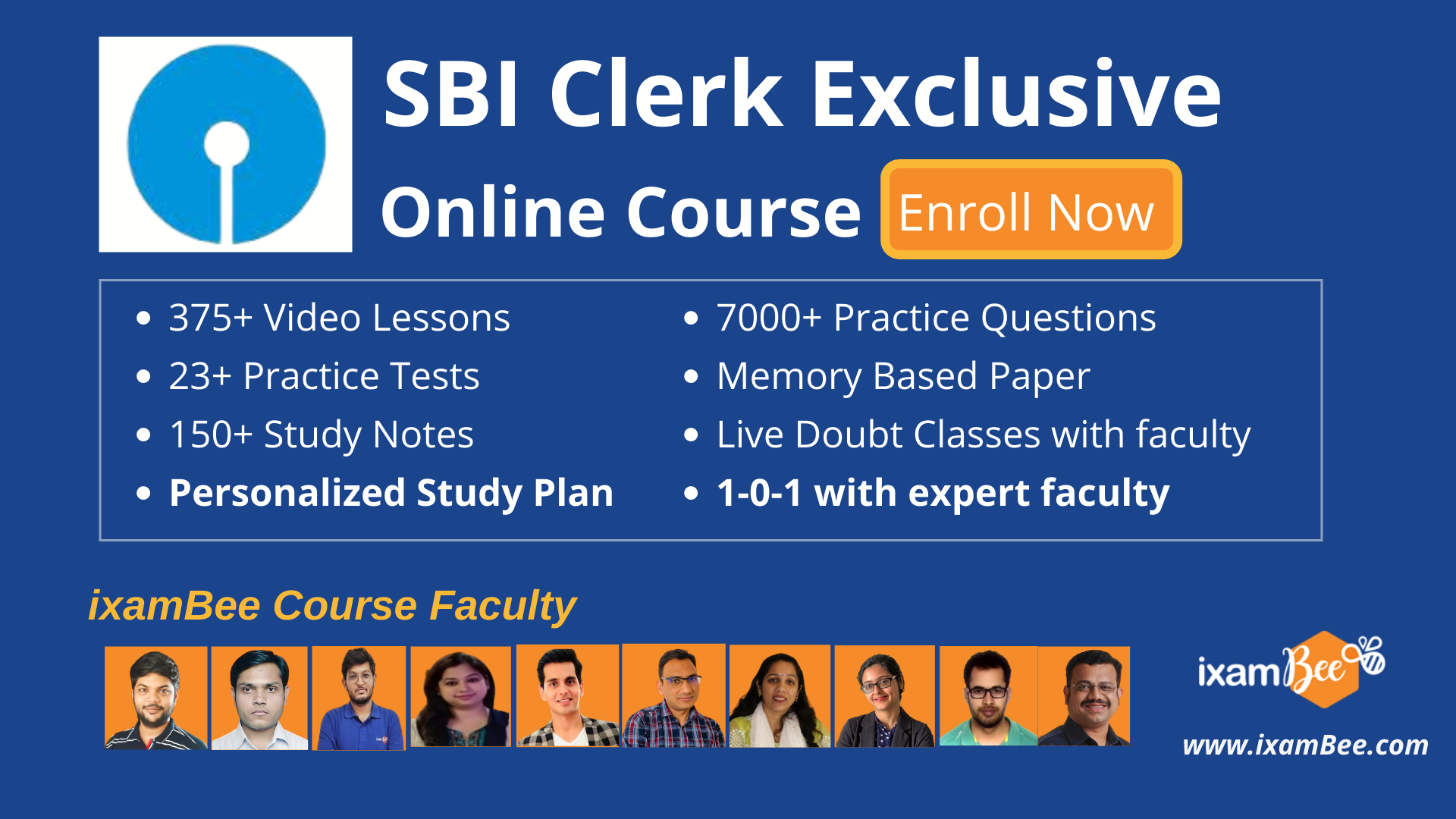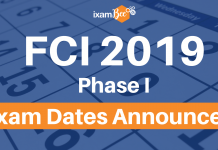Every year lakhs of students appear for the SBI Clerk examination. SBI exam is one of the most sought-after exams in the banking sector. State Bank of India is the largest Public Sector Bank and it provides surplus career opportunities. Yet most of the students face difficulty in the Quantitative Aptitude section. Many students have requested us to devise a plan for their SBI Clerk Quantitative Aptitude preparation.
With ixamBee, this section too can be a cakewalk for you. In this article, we are focusing on the preparation strategy for the Quantitative Aptitude section for the SBI Clerk exam. Let’s begin with the preparation strategy.

How to Prepare for the SBI Clerk Quantitative Aptitude Section?
Exam Pattern
To begin with your preparation know the exam pattern for both Prelims and Mains. This will help you understand the number of questions asked in this section. Please note, Quantitative Aptitude will be tested both in the Prelims & Mains.
| Prelims Pattern for QA Section | Mains Pattern for QA Section |
| No. of questions: 35 Total marks: 35 Total time: 20 minutes Marks per correct answer:1 Negative Marking for incorrect answer: 0.25 | No. of questions: 50 Total marks: 50 Total time: 45 minutes Marks per correct answer:1 Negative Marking for incorrect answer: 0.25 |
*No Sectional cutoff from 2019 onwards in SBI Clerk.
Syllabus
Next step in your preparation is to know the areas which you have to study. The table below describes the syllabus for the QA section.
- Series
- Data Sufficiency
- Data Interpretation
- Whole numbers & Decimals
- Ratio & Proportion
- LCM & HCF
- Percentages
- Averages
- Simple and Compound Interest
- Profit and Loss, Discount
- Partnerships
- Pipes and Cisterns
- Problems on Trains, Boat and Stream
- Mixture and Alligation
- Time & Distance/Time & Work
- Permutation and Combination
- Probability
Also read the detailed SBI Clerk Syllabus 2022 for all subjects
SBI Clerk Quantitative Aptitude: Topic Wise Preparation Tips
We will discuss in detail the some topics from Quantitative Aptitude from which a greater number of questions is asked every year. We have discussed at length, how you should approach these topics.
The analysis of the SBI Clerk previous year question papers makes it very simple to determine that series questions are a significant part of the quantitative capacity section. For this year’s paper, this is unlikely to change too.
Series Questions
- A series of numbers is given in such questions. They are all connected.
- Best of all, the solution to the problem becomes a cakewalk once you identify the pattern.
- There can be many patterns. namely.,
- Prime Numbers
- Squares/ Cubes
- Patterns in differences
- Pattern in alternate numbers
- Geometric series
- Odd one out
- Don’t hurry to solve those problems. Give yourself some time and 100 percent precision.
- Be careful, you could end up spending 10-15 minutes and still have no answer if you don’t practice such a question. This will cost you not only marks, but also you will end on poorly handling the other parts of the paper.
- So here’s the mantra, practise and practise. Begin by examining the basic series questions.
- Solve five series questions per day for the rest of the days. This will increase your pace, increase your exposure to many series combinations and you will also be ready for the most difficult seating arrangement questions by the time you take the examination.
Data Interpretation
- One of the key sections of the Quantitative Aptitude section is Data Interpretation.
- If you follow the recent trend of questions, the Quantitative section will certainly have one or more DI questions.
- Carefully read the questions and consider what is being asked. Do not begin to solve the question and figures as soon as you see them. Read what is being asked, and grasp it. Sometimes a couple of questions will occur that will not require even calculations.
- Check your option. Some questions will often be relatively easier to resolve than others. Identify and address these problems quickly.
- Take one question at a time to answer. Do not think about the next or the previous question otherwise you will end up intentionally wasting time and solving the question incorrectly.
- Take a look at the whole question and move on to the next question if you think it takes longer to solve.
Data Sufficiency
- Read the statements and don’t assume by seeing the data alone.
- Don’t solve the problem: Ask yourself if the information in the statements will answer the query. These issues do not require extensive and comprehensive calculations. But if you still do a lot of calculations, surely there is something you are not seeing.
- Use and merge the first statement with the main statement. If you get an answer, it is enough to respond to the first statement.
- If the first statement is not enough to find the answer, take individually the second statement and combine it with the main statement. If you can get the answer then it is enough to answer by the second statement alone.
Types of Questions Asked Previously
As aforementioned, by analyzing the SBI Clerk previous year papers, we can understand how many questions are asked from each topic on average every year. Take a look at the table below to learn how many questions you can expect per topic in the SBI Clerk Prelims exam.
| Topic | Total No. of Q = 35 |
| Series | 5Q |
| Simplification | 5Q |
| Quadratic Equation | 5Q |
| DI/Caselet DI | 10-15 Q |
| Arithmetic | 10Q-12Q |
SBI Clerk Quantitative Aptitude: Important Tips to Follow
- Practice 1-2 Data Interpretation questions daily.
- Learn tables up to 20, Squares up to 40, and Cubes up to 20.
- Learn all calculation tricks, multiplication, addition tricks and such.
- Simplification, Series & Quadratic Equations: Practice them at a stretch for the next 10 days. They carry 15 marks weightage. The more types of questions you solve from these subjects, the faster you will be able to solve them during your exam.
- Arithmetic chapters will be a game-changer for you. So practice as many questions as you can from a single topic. You will be asked several questions from Arithmetic Word Problems that are generally easy to solve as long as you practice them enough.
- You cannot answer any question wrong in such competitions. Be accurate in whatever you are doing in one go.
- Take 1 or 2 subjects at a time only. Especially if you are approaching a new or subjectively difficult topic, its best to go one step at a time.
- Give 1 hour a day for preparation for Quantitative Aptitude.
- Then take every topic for three days and solve as many questions as possible
- Identify the subjects you are weak in and try them again
- Mock tests will assist you in a number of ways in your preparation such as developing a timing strategy and solving a variety of questions at a time. Start taking SBI Clerk free mock tests right now!
- Talk about these topics with experts and resolve your doubts.
- As aforementioned, practice more and more questions every day.
SBI Clerk Online Course
SBI Clerk exam is a golden opportunity and offers a progressive career path to students and therefore to crack SBI Clerk exam you need proper guidance. Therefore, if you too want to succeed, take help from ixamBee’s SBI Clerk Comprehensive Online Learning Course.
This Online Course has been designed by experts like Ms. Arunima Sinha (Coach for Banking exams for 6 years, Ex-Manager SIDBI, Ex-Bank PO), Mr. Chandraprakash Joshi (ex-RBI GR B, MBA-Finance, Ph.D.) and Mr. Karan Sardana (Coach for Bank, SSC, Insurance, Police MAT, CLAT Exams for 10 years), Prachi Agarwal (MBA (Finance).
Take a look at the features of this course.

Also take a look at the video below to understand when the SBI Clerk 2022 notification will be out!
We wish you the best.
At ixamBee you can find a number of Online Courses, GK updates in the form of BeePedia, as well as latest updates for Bank PO, Bank Clerk, SSC, RBI, NABARD and Other Government Jobs.
Also Read
SBI Clerk Prelims Practice Test: Practice To Perform Your Best
SBI Clerk Syllabus 2022: Detailed Prelims and Mains Syllabus With Best Books
SBI Clerk Previous Year cut-offs (Prelims)













